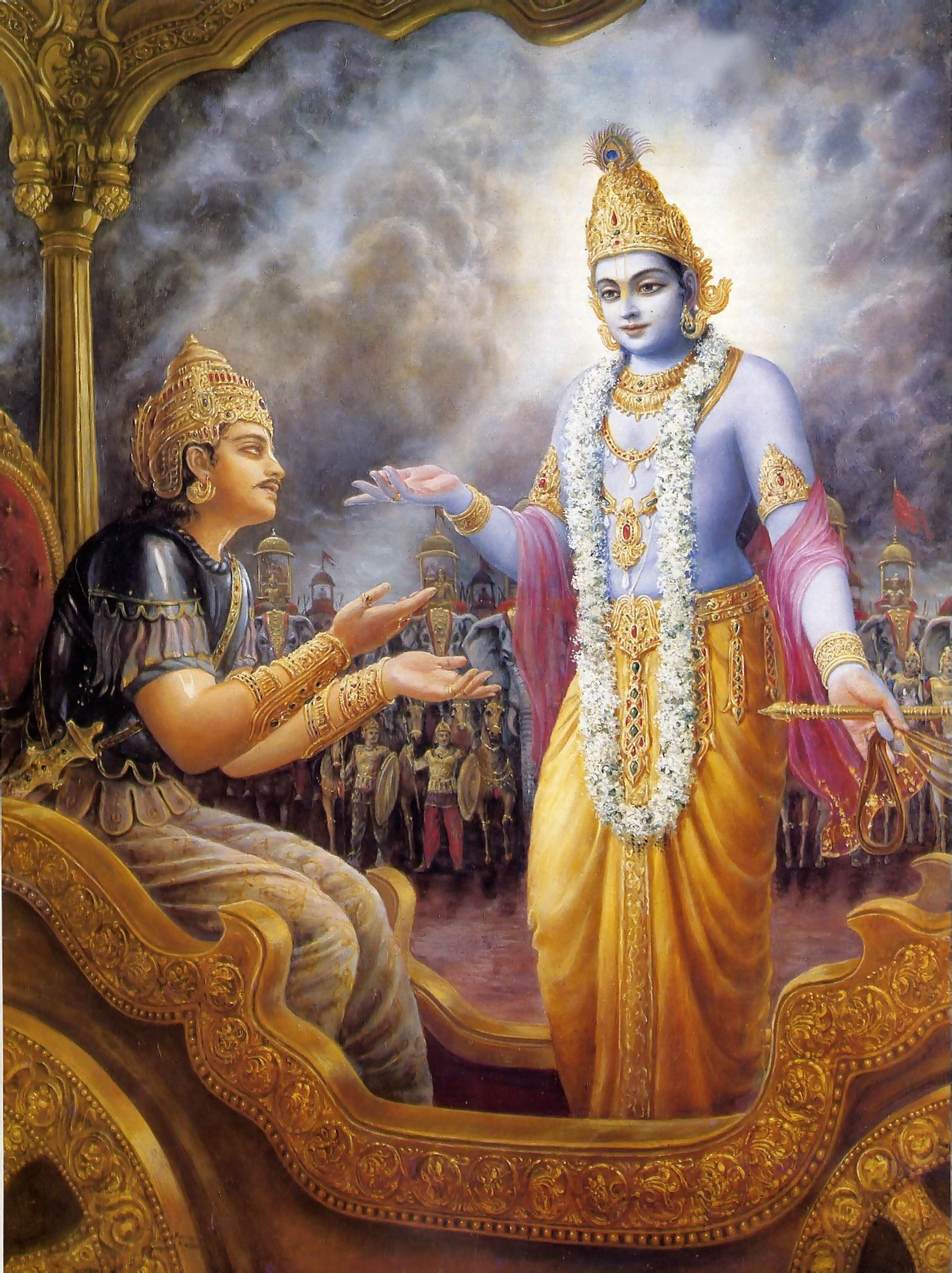#2 Where did Mahatma Gandhi, Lord Brahma and iPhone come from?

The Bhagavad-gītā does not debate the existence of God. It assumes that rational human beings can arrive at that understanding through observation, reflection, and intuition. Rather than asking, “Does God exist?”, it encourages us to examine the world deeply and honestly—to infer divinity from the very structure of existence itself.
Science vs. Spirituality — A False Divide
A common misconception today is that science and spirituality cannot go together. People assume that believing in God is “unscientific.” But in truth, some of the greatest scientists in history—those who shaped the very foundations of modern science—were firm believers in a higher intelligence.
Great Scientists Who Believed in God:
• Isaac Newton: “Gravity explains the motions of the planets, but it cannot explain who sets the planets in motion.”
• Albert Einstein: “I want to know God’s thoughts; the rest are details.”
• Max Planck: “Mind is the matrix of all matter.”
• Louis Pasteur: “The more I study nature, the more I stand amazed at the work of the Creator.”
• Johannes Kepler: “I was merely thinking God’s thoughts after Him.”
Inferring God Through Reason
Let us follow the evidence where it leads.
In everyday life, we instinctively infer a cause from an effect. When we see a painting, we assume there’s a painter. When we find a complex machine, we assume it was built by an engineer. This principle of causality is embedded in human reasoning.
Now apply the same logic to the universe.
Creation Implies a Creator
 World's most complex watch.
World's most complex watch.
The Vacheron Constantin Les Cabinotiers Solaria Ultra Grand Complication is widely considered the most complicated mechanical wristwatch ever made. It boasts 41 complications and 1,521 components.
Could this watch have come "by chance"? You think. It took eight years to make the Watch.
In essence Creation automatically implies there is a Creator. One can look at the watch and be sure there must have been a person behind it. Similarly then we live in this world - shouldn't it have a Creator behind it?
Some say that this Universe came out of nothing. When was the last time you saw something come out of nothing?
What about the Big Bang bro?
We marvel at galaxies, black holes, and the birth of the cosmos. But even more wondrous is that it all began with the Big Bang. Can an explosion on its own create such precision and order?
Imagine a bomb going off in a printing press and producing an encyclopedia. That’s absurd. So why believe that a chaotic blast created a finely tuned, law-governed universe?
Design Implies a Designer
 Michelle Obama Lands in Indian Designer's Clothes
Michelle Obama Lands in Indian Designer's Clothes
During Jan-2015 Michelle Obama visited India with her husband US President Barack Obama. She had India Buzzing About Her Outfit.The first lady emerged from Air Force One wearing Bibhu Mohapatra. Many asked her "Who is the Designer".
Very simply whenever we see design in this world we automatically assume there is a Designer. Similarly in this world we are surrounded by Design in nature - from the Rose to the Human body. God is the Designer who designed his World in very specific ways.
Take the human eye. Its iris contracts with light, the lens adjusts focus, and millions of nerves transmit signals to the brain. Biologists agree the eye is “irreducibly complex.”
Now consider DNA: a digital code inside every cell, three billion letters long, precisely sequenced. Who wrote that code? Codes don’t write themselves.
Laws Imply a Lawmaker
From gravity to thermodynamics, the universe operates on consistent, intelligible laws. But laws presuppose a lawgiver. Why does nature obey mathematics? Why do electrons always repel, or apples always fall?
Such elegant predictability doesn’t emerge from chaos. It suggests intelligence—an architect behind the curtain.
Just as architecture proves the presence of an architect, the structured cosmos points to an Intelligent Designer—what many call God.
Inferring God Through Science
During the COVID-19 crisis, “oxygen cylinder” became one of the most searched terms on Google. Hospitals were charging thousands for a single cylinder.
Yet the same oxygen that cost a fortune in ICUs surrounds us freely—on land, in the oceans, in caves, even at high altitudes.
Pause and consider: oxygen is everywhere, because life needs it everywhere. This is not coincidence—it is provision.
Take water as contrast. If I am thirsty, I must walk into the kitchen and pour a glass. Water isn’t available in mines or deserts unless brought there. But oxygen? It’s always present. This is divine logistics at work.
Now extend that to other finely tuned arrangements:
- The Earth’s distance from the Sun is exactly right for liquid water.
- The atmospheric pressure allows lungs to function perfectly.
- The force of gravity is neither too strong nor too weak.
- The electromagnetic force enables atoms to form molecules.
This level of precision is not random—it cries out for a benevolent intelligence behind the scenes.
Inferring God Through Scripture

The Bhagavad-gītā makes it simple. Krishna declares:
“I am the source of all spiritual and material worlds. Everything emanates from Me. The wise who perfectly know this engage in My devotional service and worship Me with all their hearts.”
— Bhagavad-gītā 10.8
“Everything rests upon Me, as pearls are strung on a thread.”
— Bhagavad-gītā 7.7
In Vedic thought, God is not just the creator, but the sustainer and the regulator of all existence. He is described as the “Cause of all Causes” (sarva-kāraṇa-kāraṇam).
This is not a sectarian concept—it is a definition of divinity accepted across most religious traditions.

No Comments